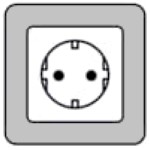Plug For Guinea: What You Need To Know
What is the plug for Guinea? Before you travel, check the information below to make sure your electronic devices are compatible with the outlet type and voltage.
Electrical Summary
Guinea uses outlet types C, F, K at a voltage of 220V and a frequency of 50 Hz.
Plug Compatibility: Type C, Type F, Type K
Voltage: 220V
Frequency: 50 Hz
Type C

Type F

Type K

Can North Americans use Electronics in Guinea without an Adapter?
No! North Americans will need an adapter for the outlets and a transformer for the voltage when traveling to Guinea. North Americans device plugs will not work with the outlet types in Guinea. Also, the voltage in Guinea is different from North American voltages.
Can Europeans use Electronics in Guinea without an adapter?
Yes! Most Europeans do not need a travel adapter or transformer when traveling to Guinea. Most device plugs will work with the outlet types in Guinea. Also, the voltage in Guinea is the same as in Europe.
What Outlet does Guinea Use?
Type C

Type F

Type C plug sockets have two round pins and no grounding pin. These plugs are typically used with devices that have a voltage of 230V.
Type F plug sockets have two round pins and a grounding pin. These plugs are typically used with devices that have a voltage of 230V.
Type K

Type K plug sockets have two round pins and a grounding pin. These plugs are typically used with devices that have a voltage of 230V.
Is it safe to drink water in Guinea?
To be on the safe side, you can use common precautions such as boiling tap water for at least one minute, using water purification tablets, or drinking bottled water. It’s also important to note that ice may be made from tap water and that foods may be washed or prepared with tap water.
We recommend always packing a filtered water bottle when traveling:
Travel Essentials
Be sure to check our list of travel essentials before your trip!
Should I get travel insurance when traveling to Guinea?
It is generally recommended to get travel insurance when traveling to a different country. Travel insurance can provide financial protection and peace of mind in case of unexpected events, such as medical emergencies, trip cancellations, lost or stolen baggage, or other travel-related mishaps.
Travel insurance can cover various expenses related to your trip, such as medical expenses, emergency medical transportation, trip cancellation or interruption, lost or stolen baggage or personal belongings, and other travel-related expenses.
Before purchasing travel insurance, it’s important to carefully review the policy details, including the coverage limits, exclusions, and any applicable deductibles or copays. You should also make sure that the policy covers any activities or destinations that you plan to participate in or visit during your trip.
Travel Summary
Guinea is a country located in West Africa, bordered by Guinea-Bissau, Senegal, Mali, Ivory Coast, Liberia, and Sierra Leone. The country has a rich history, diverse culture, and natural beauty, making it an ideal destination for travelers seeking adventure and exploration.
Conakry, the capital city of Guinea, is a bustling metropolis with colorful markets, delicious cuisine, and lively nightlife. Visitors can explore the National Museum, which houses artifacts and exhibits related to the country’s history and culture. Another must-see attraction in Conakry is the Grande Mosquée, a beautiful mosque with intricate tilework and ornate carvings.
Outside of the capital city, Guinea offers a range of natural wonders for visitors to explore. The Fouta Djallon highlands are a popular destination for trekking and hiking, with stunning waterfalls and picturesque villages scattered throughout the region. The Nimba Mountains, located on the border with Ivory Coast and Liberia, are another natural wonder, with a diverse range of flora and fauna and breathtaking views.
Guinea’s coastal regions are also worth visiting, with picturesque beaches and opportunities for water sports such as surfing and windsurfing. The Iles de Los archipelago, just off the coast of Conakry, is a popular destination for swimming and snorkeling.
In terms of cuisine, Guinea has a rich culinary tradition with a range of delicious dishes that reflect the country’s diverse cultural heritage. Visitors can sample local specialties such as yassa (marinated chicken or fish with onions and lemon), maafe (peanut stew), and fufu (a starchy dish made from cassava or yams).
Overall, Guinea is a fascinating and diverse country with a rich history, vibrant culture, and stunning natural beauty. Travelers seeking an off-the-beaten-path destination will find plenty to explore and discover in this hidden gem of West Africa.
Traveling to another country? Check out our Countries page for more info.